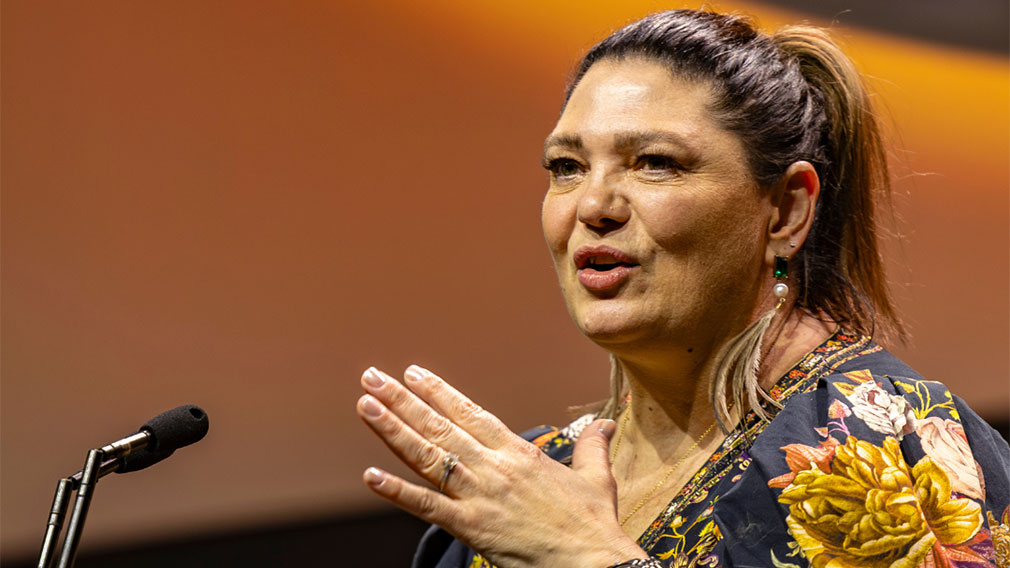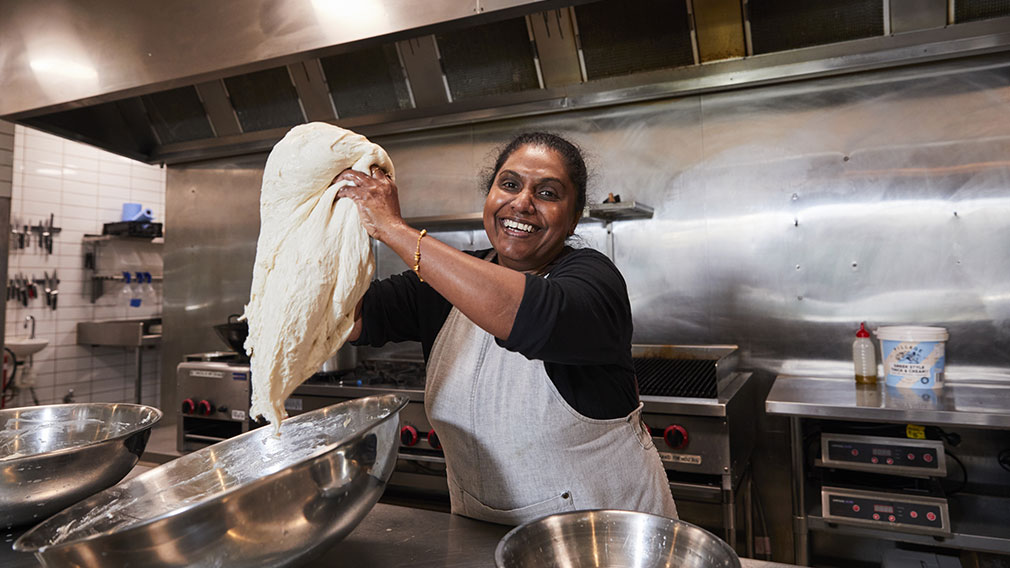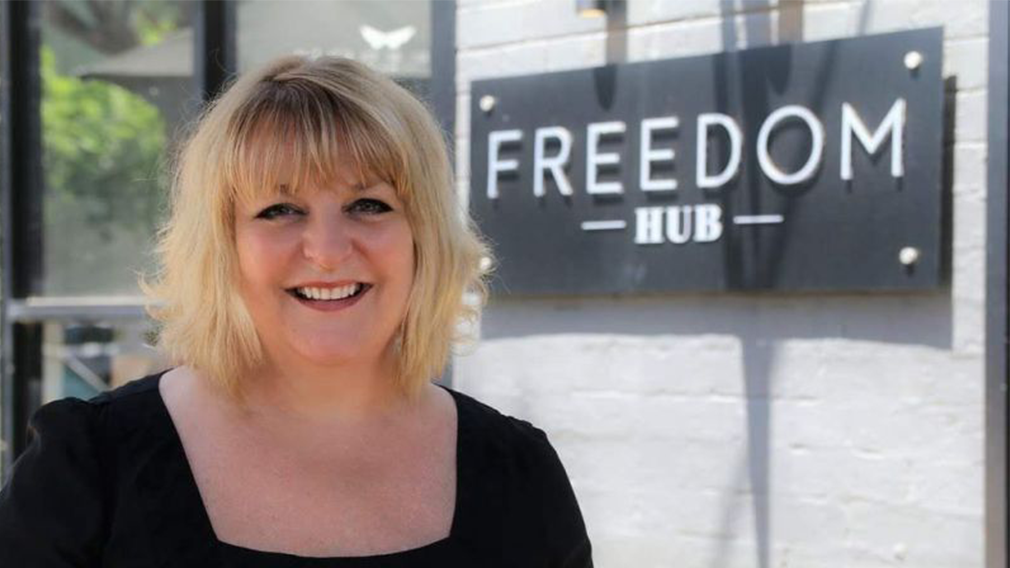‘Amazing things can happen’: Audette Exel’s wild ride to Westpac

Audette Exel in Kathmandu in 2013. “If you can connect people’s heart and their head, wow, amazing things happen.” (Jonathan Torgovnik)
Audette Exel is a firm believer in preparing for meetings.
A lawyer, former chief of a bank, non-executive director and social entrepreneur, Exel was prepped and ready when she pitched to some of Australia’s most senior corporate leaders six or so years ago about a novel idea that had one key catch: it involved them working for free.
Furthermore, Exel didn’t have prior relationships with all her targets to fall back on.
So, how do you convince time-poor investment bankers to join a new corporate advisory business where the fees go to a not for profit focused on improving the health and education of women, children and communities living in extreme poverty in some of the poorest countries in the world, such as Nepal and Uganda?
“If you can connect people’s heart and their head, wow, amazing things happen,” replies Exel, the founder of social enterprise Adara Group who today officially joins Westpac Group as an independent non-executive director.
“It doesn’t matter if you’re working in one of the branches at Westpac or you’re a health care worker on the frontline in the developing world or an investment banker or accountant or actuary, whatever you are. If you can show people they can use those skills to help make someone’s life better, wow it’s powerful, gee it unleashes people.
“It’s also, I think, the power of a good idea.”
Six years on, Adara Partners – the group’s corporate advisory arm – has advised some of Australia’s largest companies and grown its “panel” of bankers to 15, bringing together somewhat of a who’s who of the industry. It includes Guy Fowler (the son of former Westpac CEO Stuart Fowler), Philippa Stone, David Gonski AC, Christian Johnston, Cynthia Scott, Tony Osmond, Catherine Brenner, Matthew Grounds AM, Tim Burroughs and Ilana Atlas AO.
It’s one of the only, if not the only, “for purpose” models of investment banking of its type in the world, helping fund Adara Development – the group’s non-government organisation. Over 23 years, it has grown into a global leader in helping premature and low birth weight babies in areas that often lack consistent electricity, and delivering health and education services in some of the remotest places on earth.
COVID-19 restrictions on travel aside, Exel – a self-described “huge supporter” of social activism – now has further expansion in her sights, keen to replicate the model in major finance centres like New York and London to bring in even more funds to help some of the world’s most in-need people. Despite Adara putting more than $54 million to work helping people in poverty, Exel says she constantly wishes it was “more than $500 million” and has “really big plans” for the future.
“A lot of people have said to me over the years, ‘don’t you think giving begins at home’? And I’ve always said ‘absolutely I do, my home is the world’,” says Exel, who returned to Sydney in 2008 and was awarded an honorary Order of Australia for service to humanity in 2013.
“And in corporate Australia, (the model’s) got traction and that’s what I wanted. But I also want Australia to lead this globally, to show this is how you do it…and it’s the first thing I’ve really built with an eye right from the start on replicability.”
Having worked through Ebola outbreaks, civil wars, natural disasters and HIV/AIDS, Exel is no stranger to facing into a challenge and growing Adara through ups and downs (the group in late 2012 changed its name from ISIS after the rise of the terrorist group with the same name, an experience she describes as “horrifying” and personally difficult because her late father gave the organisation its first name).
She admits to making many mistakes and experiencing moments of angst and wishing that Adara’s impact could be greater, given the scale of the traumatic situations they confront, but is a firm believer in the need to “do your best, then get up tomorrow and do it again”.
An active user of social media, Exel in July penned an article on LinkedIn titled “And now for the good news…” as “therapy for myself” after a bout of despair that she feared would impact her leadership and teams. One story was that of baby Rose, who recently arrived several weeks early at Kiwoko Hospital, a “centre of excellence” in Uganda supported by Adara for many years, after her mother made it from a remote village despite COVID fears.
Exel says there’s endless similar “beautiful” stories she could tell, citing the first 136 children Adara rescued from human trafficking who she has watched grow up into young adults, one recently just winning a full scholarship to study in Hong Kong. Exel, who sees herself as the mother of thousands of kids, took personal responsibility and custody of all 136 when they were first discovered and Adara ultimately reconnected all with their families.
A down to earth Kiwi native whose father’s work as a journalist took the family to Singapore for part of Exel’s youth, a blend of tenacity, ambition, confidence and passion emanates from her every word.
It’s clearly powerful.
“I had not met Matthew Grounds before I walked in the door to pitch Adara Partners and I knew his endorsement would be critical to the whole thing,” she recalls of the former country head of UBS Australasia and now co-executive chairman of new investment bank Barrenjoey.

Exel with some of Adara Partners’ panel members, including Matthew Grounds (fifth from left) and Guy Fowler (fourth from right), who contribute to the corporate advisory business. (Supplied)
“So, I prepped really well…and I had a whole list of messaging points I wanted to get across to him. I walked into this meeting and he was really nice and normal and friendly, and then he starts by saying ‘I can’t wait to hear what this meeting is about, wow you’ve had a weird life and career!’.
“So, I’ve given him bullet point one and then two and then before I opened my mouth to give him bullet point three he goes ‘oh my god that’s a brilliant idea, yes’. And I’m like ‘holy cow I haven’t even got to bullet point 10 yet!’
“And his chief legal officer and chief risk officer, the look on their faces I will never forget it, it was such a funny moment. And then he said to me, ‘Guy (Fowler) is going to love this, can Guy come too’? And I went ‘yes, Guy can come too’. And I tell you what, I walked out of that meeting and I knew I had something and this new business idea was going to be amazing.”
Since Adara Partners got going in 2015, it has contributed more than $12.5m to Adara Development from fees made by advising some of Australia’s largest organisations, including Sydney Airport, Wesfarmers, the Paul Ramsay Foundation and the Football Federation Australia, on transactions and complex problem solving. It forms part of the $54 million Adara has contributed since Exel started the group in Bermuda in 1998, which today has around 350 service deliverers and has touched hundreds of thousands of people in poverty.
This year they will deliver services to more than 170,000 people in need, and touch countless more through their “knowledge sharing” pillar work.

Exel at the Kiwoko Hospital in Uganda. (Supplied)
“We hope that our support of the Adara Group will be a template for, and the first of, many partnerships for Adara,” Fowler, Barrenjoey’s co-executive chairman, said in March it announced a strategic partnership with Adara, noting the importance of “contribution”. As King & Wood Mallesons' David Friedlander said way back in 2016 when joining Adara Partners' panel: “This is a model that is world-changing, and is being led from Australia by Australians.”
Exel recalls back in 2015 how Fowler wanted to see Adara Development’s work firsthand before getting involved, taking up her offer to travel to Nepal in the wake of the devastating earthquake that year. More than 9000 people died in the early days of the earthquake amid horrific destruction of lives and livelihoods.
After he saw the impact of the work, Fowler was in and “did not stop doing mandates for us”, Exel says.
“We were running all these medical camps, it was full on, hundreds of people coming …with broken limbs and smashed up bodies…and I remember sitting on the ground with the wonderful man who runs Nepal for us, Pralhad, after an intense day,” she recalls.
“And I said ‘well, the good news is this is probably the worst thing we’re ever going to go through. And here we are in COVID – the earthquake was just practice!”
As a hands-on leader who historically ran headfirst into crises, COVID has been uniquely difficult for Exel leading a global operation from her computer at her home on the south coast of Sydney, unable to “reach through the screen and wrap my arms” around her team.
Dialling into our interview from lockdown, with Adara’s branding as her Microsoft Teams background, her concern for her people and communities in places like Africa where COVID is raging, and vaccines and medical supplies are limited, is clear.
She says vaccine inequity is “going to be one of the greatest moral issues of our lifetimes”, noting how The World Health Organisation’s recent call for a short-term halt to booster shots in order to increase supply to poorer countries got little traction. Just 1.6 per cent of people in low-income countries have received a first dose compared to more than 39 per cent of the world’s population, according to Our World in Data.
“I am exhausted by corporate Australia’s celebration of the rising economic tide, as the world divides into one of medical oases and deserts,” she wrote in an op-ed for The Guardian in May.
Exel says that like tackling the world’s other existential threat, climate change, “coming together” and acknowledging everyone is connected is critical to getting through COVID, but is ironically harder than ever due to the need for distancing, especially until vaccination rates rise. She says there’s a natural “sort of Maslow’s hierarchy of needs” at times of crisis as people look after their families first, but showing the “how” they can do more for developing nations in need, rather than just the “why” it’s important to help, was key.
“We’re living in a world where there’s a lot of information, a lot of misinformation, a lot of noise, a lot of fear and it’s complex, and unfortunately some of the public health messaging has been confusing as the situation unfolds in real time. And I think people are feeling a bit helpless too,” she says.
“But the next 10 years I think are going to be the most important 10 years of any of our lives quite frankly, in and around these issues. This won’t be over for one of us until it’s over for all of us. We have to solve problems globally.
“You actually need simple messaging to show people, this is how you make change and that’s what I think is lacking but I think it’s coming and I think … if you ask people to define what is the culture of Australia…I think the concept of fairness is pretty integral across all our diversity.
“So I think the recovery will be about showing people simple ways to make change built around the concept of fairness. We can all use our voice and I fully intend to do so, whether it’s at the board table or elsewhere.”
In some ways, Exel isn’t a typical board appointment for a top 20 ASX company.
Referred to over the years as a “wild child feminist activist” and a “leftie who loves a deal”, she’s more likely to be found working on Adara’s involvement in developing new technology for delivering oxygen to newborns without electricity than plotting out a fresh NED (non-executive director) role.
Still, her business experience runs deep.
After her law career took her through Australia, Hong Kong and to the island of Bermuda off the east coast of the US, at just 30 she was appointed managing director of Bermuda Commercial Bank, which she ran for four years. She also chaired the nation’s stock exchange and served as a director of the central financial services regulator, before moving into social entrepreneurship and setting up Adara. It began focused on Nepal where she’d previously travelled, and Uganda after a chance prior meeting with the First Lady of the country at the time, but expanded over time, building centres of excellence that now have a wider global impact.
After sitting on the board of one of the world’s largest protection and indemnity clubs for the global shipping industry for more than a decade, more recently she spent eight years on the board of Suncorp.
Exel is clear she doesn’t want to be pigeonholed as the “social activist person” on the board.
She sees herself as the “engagement person” who can bring strong and deep business experience together with a passion for social change. Exel, who joins Westpac’s board following the appointment of Nora Scheinkestel (a former Adara Partners panel member) earlier this year, says board diversity is constantly increasing globally as part of the “zeitgeist shift” in how business thinks about its role in the world, and ESG (environmental, social, and governance) issues rise to the fore.
She adds that while the pace of action can always be debated, corporate Australia in many ways showing “real leadership” in tackling major challenges like climate change.
“Once upon a time it may have been unusual to appoint me because I’m a woman, now it may be less usual because I’m a woman who is so passionate about social justice, but I think in five or 10 years time it will be more mainstream,” the Leonard Cohen fan says.
Westpac chairman John McFarlane in July added: “Audette’s extensive business leadership experience, entrepreneurship and deep contribution to philanthropy will bring new insights to the board and complement Westpac’s purpose of helping Australians and New Zealanders succeed.”
Asked why she accepted the offer after a difficult few years for the bank, Exel says the company’s importance to the Australian and NZ economies, along with commitment to ethical banking and diversity and inclusion, brought a unique opportunity to help make change from within one of the nation’s largest organisations.
“There’s many ways to affect social change. I began focused on activism…but for me…my little stitch in the tapestry of change is to sit in engagement,” she says.
“I have come to believe that the most helpful thing I can do is not to stand on one side or the other throwing stones, but to sit in the middle and try to unite - and I believe that the provision of responsible financial services has a massive impact on society.
“So when this offer came along I thought ‘OK, this is a chance at the highest level of corporate Australia at what is a truly great company that is systemically important, what an opportunity to be given to support and influence Westpac to operate at the highest levels of ethical financial services provision and touch the lives of as many people as possible’, particularly at a time where it’s been a very hard few years for the company and it is rebuilding culture, rethinking risk, reconsidering how it operates at the highest levels.”
And what’s next for Adara and Exel?
She flags a new major campaign around vaccine equity isn’t far off and is progressing taking Adara’s “for purpose” model global. The timing couldn’t be more apt, with the pandemic thrusting an additional 97 million people into poverty in 2020, according to the World Bank.
“The impact and scale of the organisation now is way bigger than I thought it would be,” Exel reflects.
“You never know do you, what good you’re doing and what bad you’re doing and who you’re inspiring and who you’re terrifying, but I hope we’ve inspired a few people along the way, both in the business sector and not for profit sector.”




